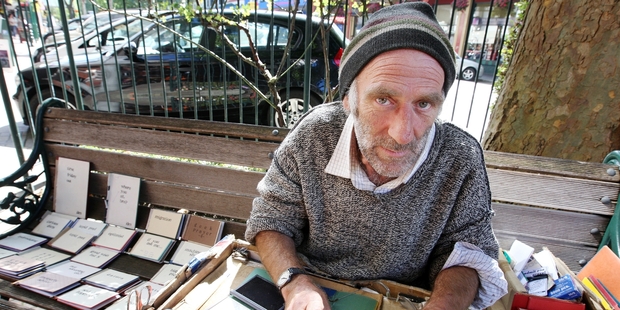Turn off, tune out and enjoy life
Source: Adam Gifford
 Reformed tech industry worker David Merritt. Photo / Tracey Grant
Reformed tech industry worker David Merritt. Photo / Tracey Grant
David Merritt was an early adopter who immersed himself in the internet even before the world wide web.
He worked for ISPs, wrangled websites, taught digital design, worked as a technology journalist and, in association with the late Paul Reynolds, wrote a "how to" book on the internet for New Zealanders.
And then he switched off, went off the grid, let his email accounts expire, and aspired to master no technology more advanced than a 1974 Land Rover.
"My solution was simple but pretty drastic, getting rid of the electricity and living rough out in the wopwops for a few years. By then I'd done almost 20 years of computing, so I knew it was a question of balance. I was out of whack," he says.
Merritt says he gained many real-time skills and experiences.
"I learned to be a lot more self reliant. I learned some patience and started to think more about seasons, years, waiting. I learned to enjoy my own company. And listen. I heard nature with a lot more intensity, wind in trees, water passing over rocks."
He's back online to a limited extent - an occasional post on Facebook to advertise a reading or the place he is selling his poems - and says it's worrying.
"It's still highly addictive to me so I have to be conscious of how much time I spend there. I learned that the digital river keeps on flowing, at full spate flood, all the time.
"It has many currents in it, and as humans we are still finding our way as far as learning not how to just use it without giving over too much or too many of our senses."
That's an extreme example of digital detox.
But people may need to consider switching off the devices that plug them into networks of data and voice every waking hour.
In France, unions forced the issue, negotiating an agreement for 250,000 employees in the technology and consultancy sectors, including the French arms of Google, Facebook, Deloitte and PwC, which required them to disconnect from work calls and emails after working hours.
It's a problem of work-life balance that will only grow as a generation of digital natives who have grown up with technology moves into the workforce.
Michael Vacaru, who is researching mobile phone use among adolescents as part of his studies towards a doctorate in public health at the University of Auckland, says many young people get anxious and depressed if they are cut off from their phone.
While as a non-clinician he avoids using the language of addiction, it's how many people describe their engagement with sites and social networks.
Vacaru says an obvious warning sign is to continue using a phone or device even when it causes problems. Playing games at 3am, not focusing on work or school, continuing to text or mouse even when excessive use is damaging fingers and tendons in the arms.
The instant responsiveness of a digital device demands an instant response. People feel snubbed if their text or email is not responded to immediately, whatever the hour.
But you're not at school now. You're in the workforce, and it may be time to exercise some control.
So what do you get by switching off your cellphone, apart from suddenly dropping out of the GCSB data stream?
It may be better mental health, without the stress of constant digital disruption.
Productivity may go up as you concentrate on the task at hand rather than the Trade Me account or the cat videos.
Your body may feel better as it is no longer forced into awkward postures or movements to interact with that shiny slab.
Your relationships could improve as you find yourself in more face-to-face communications where you can actually pick up signals from an actual human body instead of a series of emoticons.
British journalist and blogger Frances Booth, the author of The Distraction Trap: How to focus in the digital world, offers five tips digital detox.
• Expect withdrawal symptoms once you've switched off your phone/pad/computer, including a strong urge to check your phone/email/social media, a feeling of boredom, and a sense of unease. These feelings should pass.
• Expect FOMO, fear of missing out. Maybe you will, maybe you won't, but think instead JOMO, the joy of missing out. "Enjoy playing your own thought soundtrack instead of having your thoughts led by social media."
• Before you switch off, plan your agenda. Print out maps, look up any travel or visiting information you need, and if you are arranging to meet someone warn them you will not available by phone.
• Start small and don't sweat it. If you aim for 24 hours and break at 12, don't beat yourself up. Try again some other time.
• Don't do nothing. Plan some interesting activity in place of screen time.
Just breaking patterns and habits may be enough for many people.
Adbusters advocates a digital detox week - take a hike, it says - but it also suggests taking a zen moment.
Tomorrow morning, before you switch on your computer, look at the reflection of yourself in the dark, empty screen for 60 seconds. Meditate on your relationship with this box. What is it really all about?
| }
|